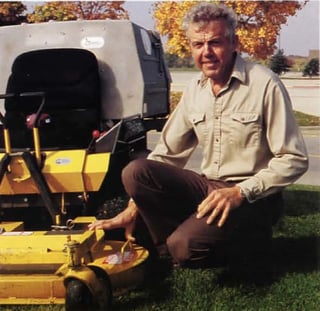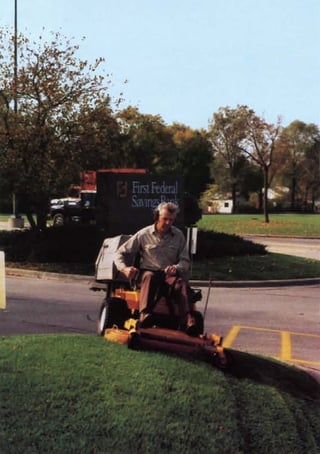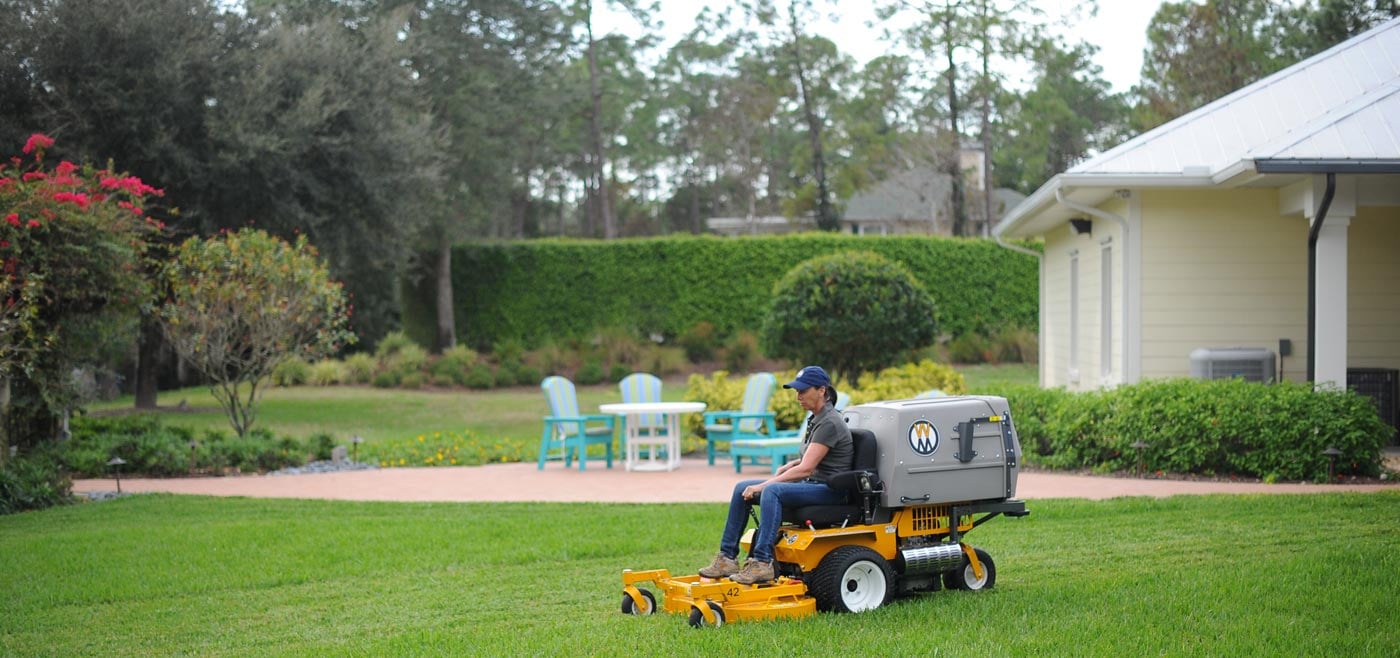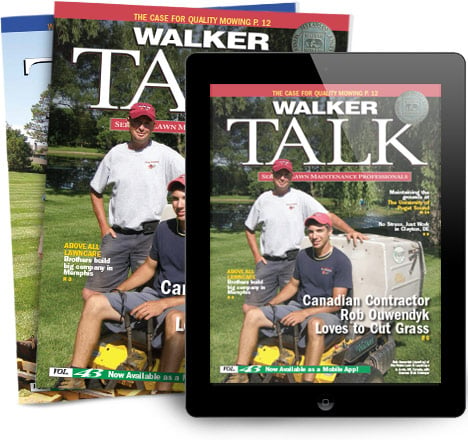Roland Wenig is a late bloomer in the lawn maintenance business. He hung his shingle when he was 42 years old. Ten years later, he has no regrets about his career choice.
 "I was born and raised on a dairy farm in Iowa," tells Roland, owner of D & R Groundskeeping, Rockford, Illinois. "I enjoy working outside, and I enjoy working for myself." The latter, however, was not totally his decision. A factory layoff and a generally poor economic climate left him little choice.
"I was born and raised on a dairy farm in Iowa," tells Roland, owner of D & R Groundskeeping, Rockford, Illinois. "I enjoy working outside, and I enjoy working for myself." The latter, however, was not totally his decision. A factory layoff and a generally poor economic climate left him little choice.
Today, the economic climate in Rockford has improved slightly. But jobs are still hard to come by. Roland knows that just by the number of "mowers" out there, the term he uses to describe people who get into the lawn maintenance business only to leave after finding the road too tough and too demanding.
"I'm not an egotist," explains Roland, "but I'm proud of what we've accomplished over the years. When I started, we had a snowmobile trailer, a van, couple of walk-behind mowers and a handful of accounts." Today, his clients range from several Rockford banks, a dentist's office, lawyer's office, architect, a restaurant, a condominium complex and 20 plus "executive homes." He does it all with his two Walker mowers, one 16-hp and one 20-hp model; two 21-inch walk-behinds; a complement of handheld power equipment; and a part-time employee or two, depending on the time of year. His wife worked full time in the business until three years ago.
During the start-up years, Roland took landscaping courses at two area colleges to learn his profession. He has since become an accomplished landscaper who prides himself with being able to supply customers with unique-looking landscapes. He is also a certified applicator and repairs customer irrigation systems.
He attributes his success to two things: his drive to provide quality care and his decision five years ago to buy his first Walker. They both go hand in hand, he notes.
Complete Care
D & R Groundskeeping provides "complete" care. The owner prefers that to the term "full service."
D & R strives to keep landscapes and lawns in natural balance by supplying timely help. Roland doesn't fertilize for fertilizing sake. "After all, " he notes, "lawns in our area need only three applications a year, four if the customer has a sprinkler system.” He uses granular fertilizers and only applies herbicides when it is needed. "No point in bathing the entire yard with chemicals when only a part of the yard might be in need of some control," he points out.
Roland's pragmatic approach to lawn care led him to a Walker trade show booth better than five years ago. He liked what he saw but couldn't justify the costs. "The dealer kept on bugging me about the mower, and I kept on telling him it was too expensive," remembers Roland. "Then one day the dealer just left a Walker mower at my place and told me he would pick it up a week later. When he called he said, 'There's no point in coming over, right. You've decided to keep the machine.' And he was right.”
According to Roland, two things sold him on a Walker, the unit's bagging system and its maneuverability. There's no comparison between how a Walker bags and how other mowers on the market bag, notes Roland. Even in very tough, wet conditions, the Walker won't plug. As far as maneuverability is concerned, Roland says he was a little scared when he first got on the machine. "It was fast, real fast. But I got used to it in a hurry," he remarks. To be sure. The first Walker cut down on hand mower use by 60 to 70 percent. Since then, D & R does three times the number of accounts it used to in the same amount of mowing time. As Roland puts it, he can mow a lawn in 20 minutes now, where it took him an hour before with two walk-behind mowers.
"If it weren't for the Walkers, I wouldn't be where I am today. I enjoy what I'm doing, I don't advertise, l have plenty of work and I don't owe a penny on anything."
Mulching Dilemma
The Walker bagging system alone saves D & R on employee and machine hours. Before his first Walker, Roland says he used to make two trips to pick up leaves, one trip with a Billy Goat vacuum; the second with a mower. Now he makes just one trip with the Walker and saves his Billy Goat for cleaning up beds. The leaves and clippings are simply loaded into a truck and dumped on a five-acre parcel he owns. Although a farmer this year asked to have exclusive rights on the leaves.
Indeed, bagging is - or was- a way of life in Rockford. Dumping fees that have soared to $40 a ton make finding alternative ways of dealing with debris a necessity. Not all area lawn maintenance operators have access to private landfills. Yet even Roland appreciates the time saved by not having to remove clippings. That is difficult, he says, when the prevailing philosophy is, "You don't catch it, you don't mow it." The philosophy is especially prevalent in the "executive" homeowner market where D & R is firmly entrenched.
Understanding the value of leaving clippings behind and being practical about saving time and money, last year Roland innocently pulled the proverbial wool over his customers' eyes. He simply replaced a bagging deck with his mulching deck and mowed on. As he relates, customers never knew the difference. "They were getting a beautiful cut and manicured look, along with the additional nutrients provided by the clippings. I was saving time."
But mulching isn't for everyone. In fact, last year the Midwest suffered through so many rainy days that bagging lawns was the norm. Still, Roland pulled up to each property with three deck options: bagging, mulching and side discharge. He says he makes an assessment about the grass, then changes the deck to suit the conditions. "I've changed decks in less than three minutes," he tells. "Normally, it takes around four minutes."
 Neat Niche
Neat Niche
A lot of landscapers and lawn maintenance professionals around the country would like to operate the way D & R does. Roland has a loyal customer base. His largest bank customer First Federal has five properties and has been with D & R since the beginning. A couple of "executive homes" have been with D & R from the start, too. One lady, notes Roland, has asked him to move one perennial bed at least 20 times over the last 10 years. He doesn't do any advertising, not even the Yellow Pages. And there's no sign on his truck.
There's no question that D & R could handle more accounts by adding a mower or two and hiring a couple of key employees. As Roland relates, the equipment isn't the problem. Finding key employees is. Still, be plans to grow his current business slowly and quietly.
Look for his business to double if not triple five years from now. These aren't Roland's words, and they may not even be his thoughts. But some things in life are worth pursuing, with controlled vigor. Roland has found his niche... and so will more customers who know quality when they see it.




 Site Search
Site Search



